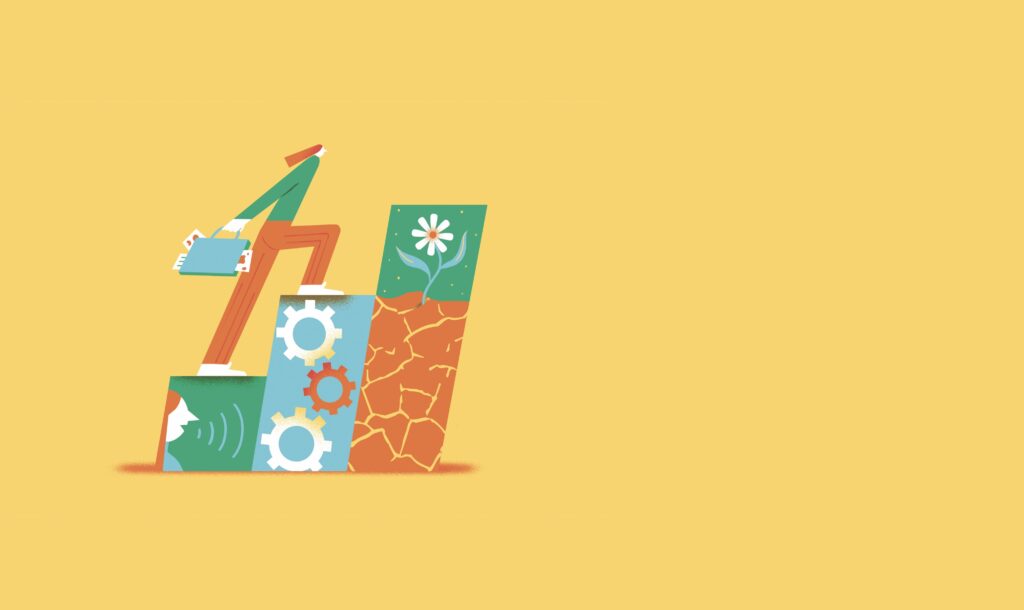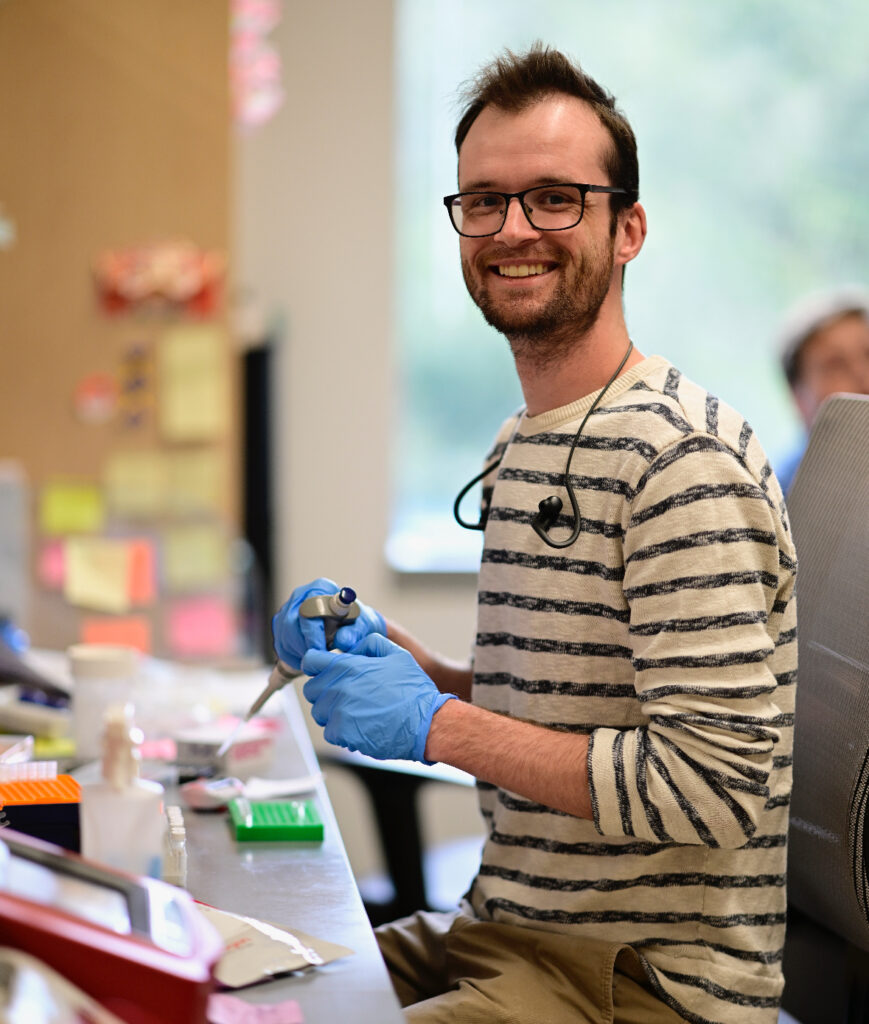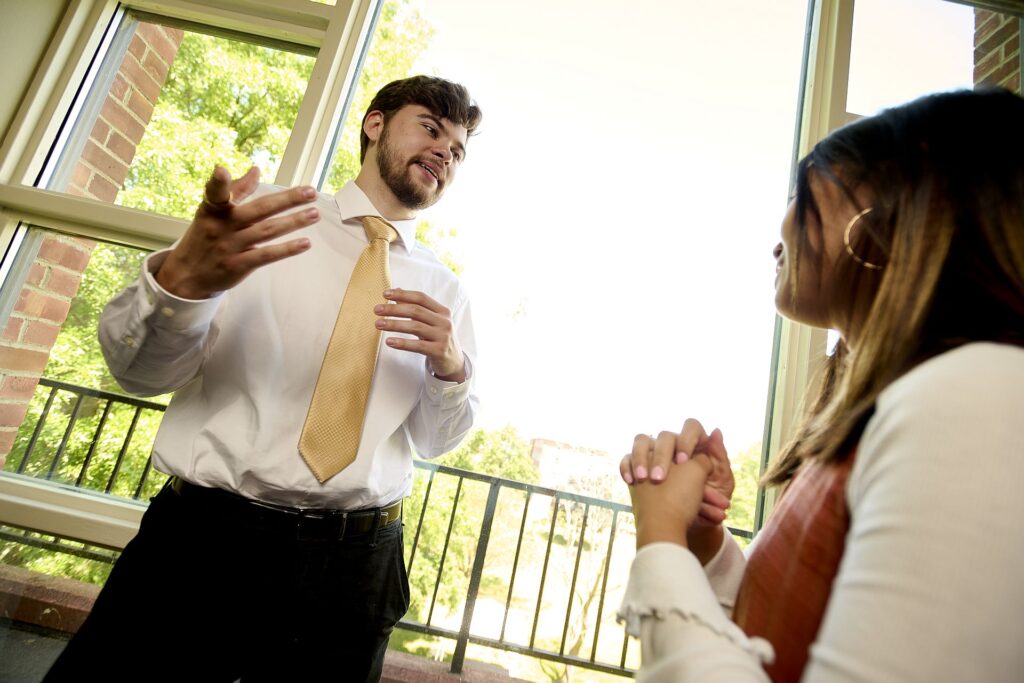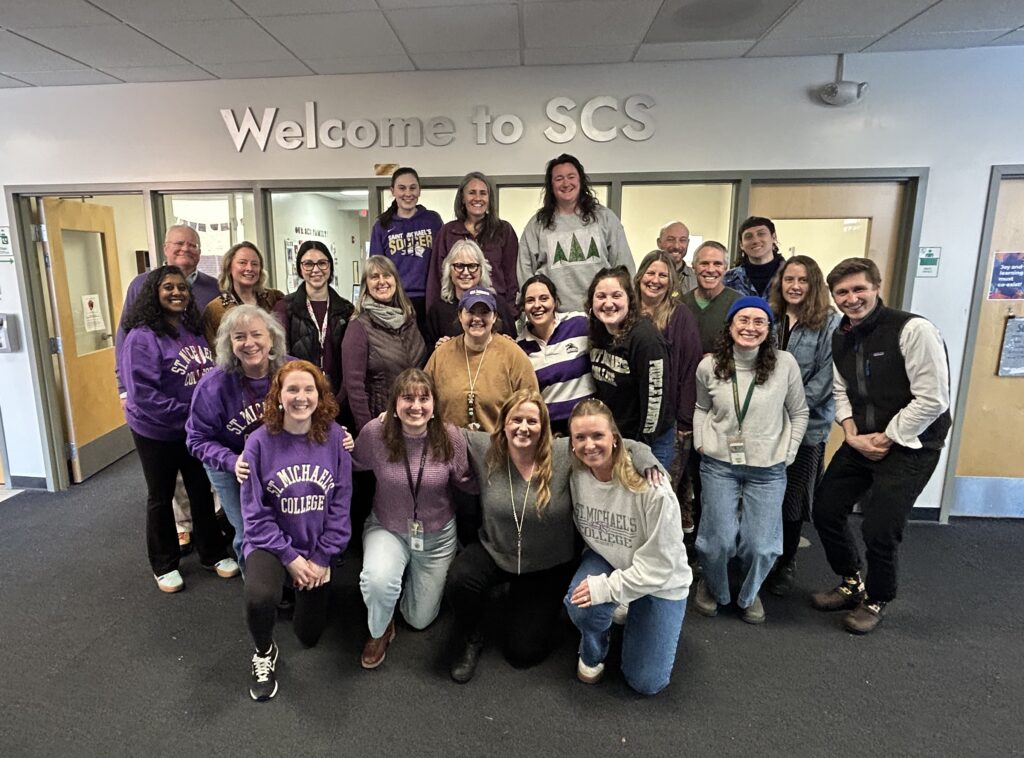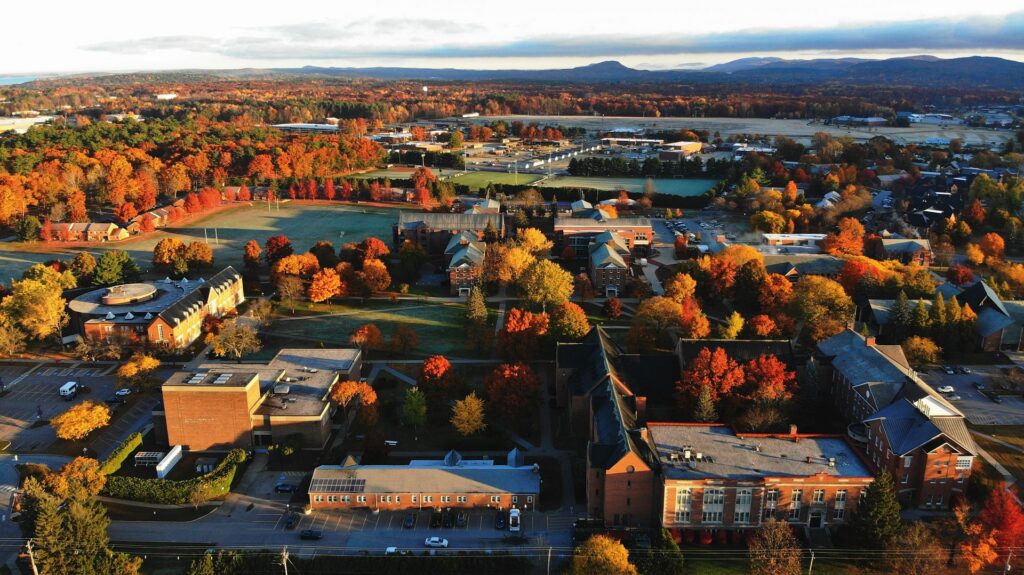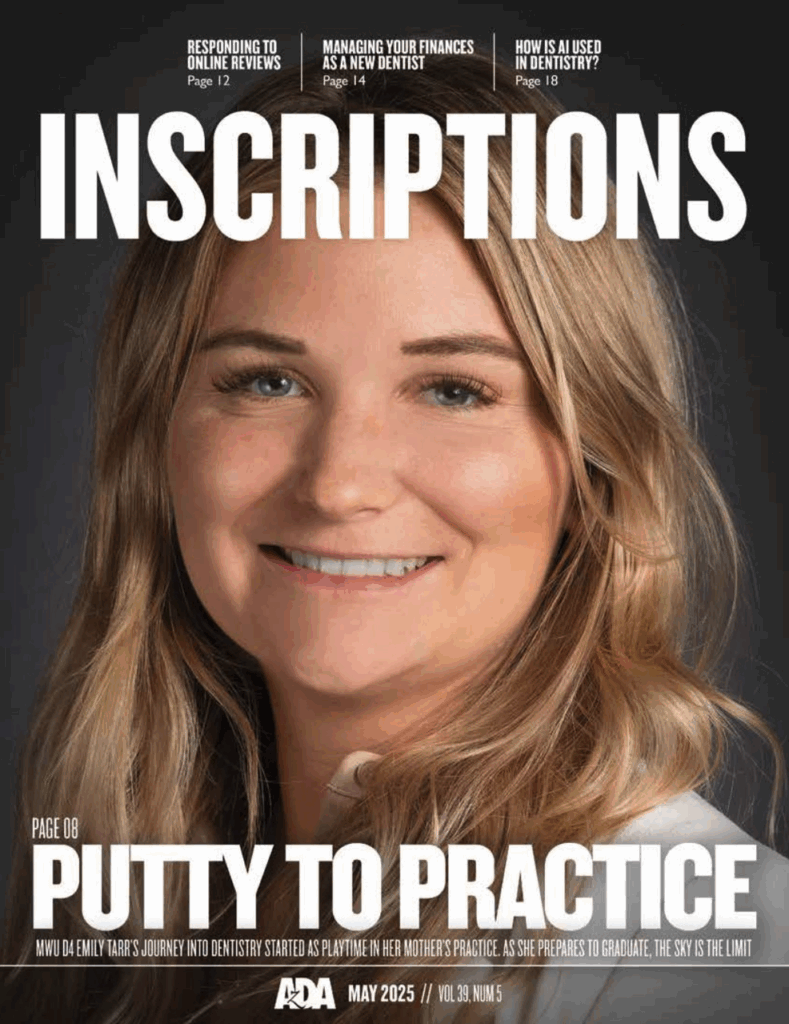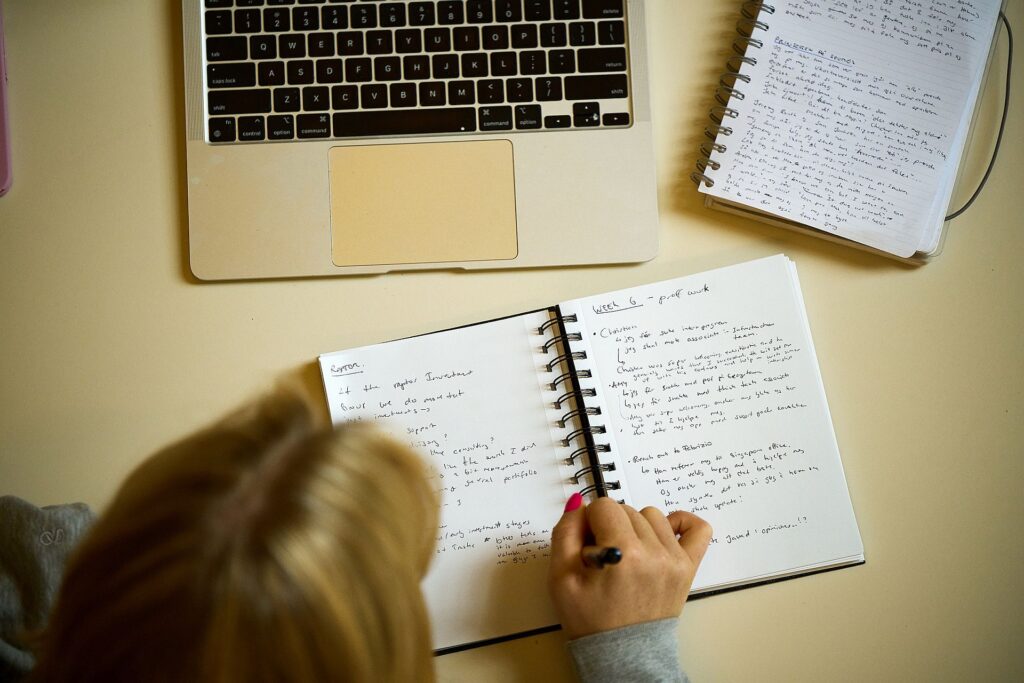Confidence Calisthenics: How St. Mike’s helps students strengthen their belief in their own abilities
This article is included in the Spring 2025 edition of Saint Michael’s College Magazine.
When he begins a new semester, Brian Collier, a professor of fine arts and design at Saint Michael’s, likes to tell students about the near-catastrophe of his first big show. It happened long before
he started teaching, when he was invited to exhibit his work at a prominent contemporary art space in Buffalo, New York.
He was slated to give an artist’s statement as the exhibit opened. He was nervous—he wasn’t accustomed to speaking to a crowd—but he had written down his remarks, and decided he’d be OK if he just read them aloud. As he stepped to the front of the room, disaster struck.
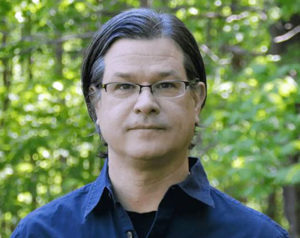
Brian Collier, associate professor of Art & Design
“They turned off every light in the space. I mean, it was pitch black, and I could not read a word of my text,” Collier remembers. “That was when the panic really hit me hard.”
What followed, Collier says, was a kind of out-of-body experience.
“I blacked out,” he says with a laugh. He doesn’t remember much about the following few minutes. Speaking into the darkness, he winged it as convincingly as he could. When the lights came up, he was sure he had just embarrassed himself, but to Collier’s surprise, everyone seemed to think he’d done fine. The worst had happened, and he’d emerged unscathed.
That close call with disaster became a source of confidence that would help him through countless other presentations, he says, and that’s why he tells the story every year. The undergraduate artists in Collier’s classes spend the semester making and sharing creative work in ways that can make them feel incredibly vulnerable. If they’re going to succeed in the course, they’ll need the confidence to take risks—and sometimes that will mean flirting with disaster.
Collier isn’t unusual in making confidence building a key part of his approach to teaching. Education at Saint Michael’s takes many forms, whether business courses, athletics, service programs, the study of fine arts, or something else—but confidence runs through virtually all of them. In some cases, it’s course work and explicit instruction that helps build confidence. In other cases, it’s different experiences that allow students to take risks and gain confidence on their own. Whatever the specifics, Saint Michael’s unique approach to learning ensures that all students come to believe in themselves: in their skills, in their knowledge, and in their ethical and moral commitments.
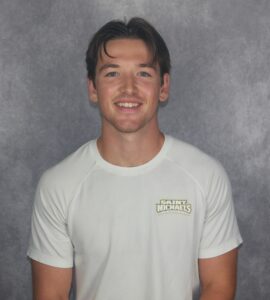
Aidan Robin ’27
As we spoke with faculty, students, and alumni, we found that a focus on self-assurance is woven into the fabric of a Saint Michael’s education in ways that aren’t always obvious. Cognitive science tells us that repeated success in a given endeavor can help to build confidence by releasing reward chemicals in the brain. The mechanism is simple: Success feels good, and that makes us feel like succeeding again. But the converse is also true: Failure can hurt, and make us avoid whatever experience made us feel that way. Therefore, building confidence means maximizing successes—even if they’re small wins at first—and minimizing painful failures.
Collier helps his students build confidence through a process of graduated risk taking. Students are asked to present and explain their work constantly, first to peers in small groups, then to the class as a whole, and eventually to the entire community in public exhibitions. That kind of training—call it confidence calisthenics—can be highly effective. It’s not unlike an athlete’s training regimen, in which drills and exercises help make a given physical activity second nature.
For Aidan Robin ’27, a member of the Saint Michael’s Alpine ski team, training on the slopes is physical, of course, but confidence is also an essential component of racing. “Everything in the sport kind of ties back into confidence and believing in yourself and everything that you’re doing,” says Robin. Weeks of preparation with his coaches and teammates culminate in a race that will last barely 60 seconds, and the only way to execute in that moment is to believe you can do so. “For me, personally, a lot of that confidence comes from my preparation and the quality of my training and how focused I am during training,” Robin adds.
The College’s approach to cultivating inner strength can look quite structured and deliberate,
as in Robin’s training on the slopes. But the school also fosters confidence simply by making a wide range of challenging opportunities available to students.

Yamuna Turco ’25
Yamuna Turco ’25 is the kind of student who seizes every opportunity that comes her way. In her time at Saint Michael’s, she has organized a large-scale research study, interned with a local TV news station, and traveled abroad; she even won the title of Miss Vermont in 2023. It was the College’s focus on life beyond campus that made her want to attend in the first place. “What really drew me to St. Mike’s was the emphasis on social justice and community involvement,” Turco says. “It was super important for me to be involved in the community that I live in, instead of staying in an isolated bubble.”
Her efforts have challenged her and haven’t always gone smoothly. While studying abroad in Vietnam, Turco came down with an illness that ultimately required hospitalization. It was the kind of experience that can be scary or even dangerous when you’re far from home. Turco wasn’t facing it on her own, however, and she was able to contact school representatives who helped her find healthcare and deal with medical insurance, and with that support, she was soon back on her feet.
Turco’s experience highlights an important element of the College’s approach to boosting students’ belief in their own abilities: the emphasis on supported risk taking. Students are asked to get out of their comfort zones—to display their artwork for critique or travel 8000 miles from home—but it’s not a sink-or-swim proposition. Faculty guidance ensures students can take controlled risks, the kind that provide those chemical rewards in our brains.
Confidence shows up in our responses to the challenges we face in our work or studies. And it’s also a part of how we carry ourselves in the world. Saint Michael’s aims to produce not just accomplished professionals and scholars, but also whole people with a well-developed sense of ethical responsibility.

Crystal L’Hote, associate professor of philosophy
Those less tangible goals are the domain of Crystal L’Hote, professor of philosophy and ethics and the chair of the Philosophy and Ethics Department. In The Nicomachean Ethics, L’Hote explains, Aristotle describes virtuous confidence as a form of self-knowledge, a truthful assessment of one’s abilities. Under his concept of the “golden mean,” virtuous confidence is bounded by recklessness on one side and fearfulness on the other. On the most basic level, confidence is seeing oneself with clear eyes.
For L’Hote, the College’s whole approach to education is tailor-made to produce this kind of knowledge of the self.
“One of the things that I think is so helpful about a liberal arts education, or what we might just call a well-rounded education, is that students come to know their capacities and also their limits,” L’Hote says. “They’re trying lots of different things and figuring out what they’re naturally inclined to—and what requires more work.”
For more than 35 years, Saint Michael’s students looking to expand their world have done so via Mobilization of Volunteer Efforts, the school’s volunteer service program, more commonly known as MOVE. The MOVE program facilitates volunteer efforts with students at public schools in the Burlington area, and annual trips farther afield, to places like the Deep South and Latin America.

Lara Scott, director of Mobilization of Volunteer Efforts (MOVE)
The personal growth that happens in these programs is multidimensional, says MOVE director Lara Scott. MOVE missions are overseen by faculty, but they’re largely driven by participants. Students are asked to handle the logistics of travel, to create programming, and to communicate with stakeholders on their own—significant responsibilities for undergraduate-age students. These activities have a dual benefit, helping both the communities served and the students themselves, Scott says.
“A critical part of how we approach service in the community is this idea of reciprocity. So there’s certainly stuff that we are giving, but there’s also stuff that our volunteers are gaining,” Scott says.
Aside from skills developed while organizing complex projects, the missions themselves offer another kind of personal development, by providing students insight into lives that are often very different from their own.
Scott is particularly proud of a long-running program that facilitates weekly volleyball games between MOVE volunteers and residents of the Chittenden Regional Correctional Facility, a women’s prison in South Burlington. Every other week, a group of volunteers travel to the facility to play volleyball and socialize with the women there.
“It’s a chance, I think, to disrupt assumptions and disrupt stereotypes that might exist about folks who are navigating the correctional experience,” Scott says. That kind of volunteer work can shift perspectives, and that new awareness can bolster students’ belief in themselves.
Sometimes improving self-esteem requires a reassessment of one’s own abilities, and often, that’s possible only with help from a mentor. The small class sizes and tight-knit community at Saint Michael’s make a kind of mentorship possible that’s much more difficult at larger institutions. Garrett Clark ’12 experienced that phenomenon firsthand.

Garrett Clark ’12
As a star defensive lacrosse player in his hometown of Hingham, Massachusetts, Clark had, by the time he arrived at Saint Michael’s on a lacrosse scholarship, cultivated a personal identity as an athlete, but not necessarily as a student. After his first semester, his GPA was around 3.2, which is just about average. For Clark, that sounded OK—his focus was still on athletics—but those around him disagreed.
“The first week back, second semester, my First Year Seminar teacher sent me a message and
said, ‘Hey, come to my office hours, we need to talk,’” Clark recalls. “Basically the conversation was: You’re not performing to your potential, and you have a lot more to offer.”
It was a “tough love” conversation that he wasn’t thrilled about at the time, Clark says, but it prompted him to reassess his own abilities. He started taking more challenging classes in accounting and business, and found that he excelled in them. Clark credits his burgeoning confidence for pushing him through a prestigious master’s degree program at Boston College and all the way to his present-day career as a financial auditor.
Like other community members we spoke with, Clark says the education he experienced at Saint Michael’s helped prepare him for life’s subsequent challenges. Students leave campus with a strong sense of self and the knowledge that they’ll be able to overcome whatever obstacles they face. Whether through his coursework, athletic accomplishments, or off-campus activities, Clark says his time at the College helped lead him to where he is today.
“I think the liberal arts foundation that St. Mike’s gave me—in terms of problem solving, experiential learning—all of those things really [created] the foundation that I’ve continued to build upon,” Clark says. “And I don’t think I’d be in the same position without it.”

For all press inquiries contact Elizabeth Murray, Associate Director of Communications at Saint Michael's College.
